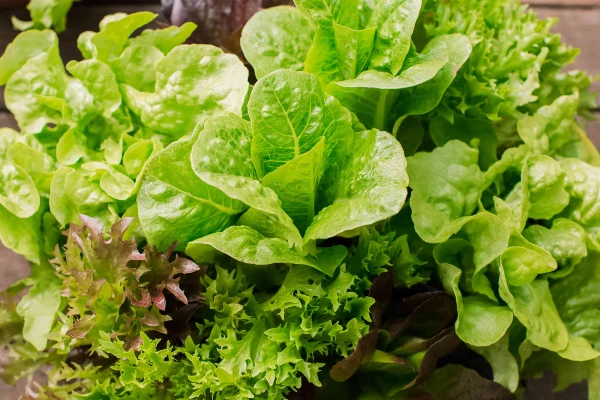Leaf lettuce benefits, calories, storage, side effects
Leaf lettuce Nutrition

| Leaf lettuce (100g) Nutrition | |||
| Carbohydrate | Protein | Fat | Calories |
| 3g | 1.4g | 0.2g | 16kcal |
| Main Nutrition | Iron, dietary fiber, vitamin K | ||
| Main Benefits | Improve insomnia, relieve constipation, manage weight, prevent anemia | ||
| Side Effects | Do not consume when taking blood thinners. Excessive intake may cause drowsiness. | ||
Leaf lettuce is a plant belonging to the Asteraceae family and is mainly used for food. There are many different types of lettuce, including Leaf lettuce. Its origin is Europe and Western Asia, and in Korea, where the ssam culture is developed, it is mainly consumed as ssam. It is rich in iron and helps purify the blood. It is also known to have the function of suppressing the accumulation of cholesterol in pork when consumed with pork, so it is popular when eating pork such as pork belly. It can be seasoned with seasoning and eaten like geotjeori, or used as a side ingredient in bibimbap.
Leaf lettuce benefits

1. Sleep health
Leaf lettuce is well known as a sleep-inducing food. Leaf lettuce is well known as a sleep-inducing food. Lactuserin is called a natural sedative, helping to calm nerves and improve sleep quality. Lactucin is also an anti-stress ingredient that helps with sound sleep, helping to relieve tension and help you get a good night’s sleep. These ingredients also help prevent and improve sleep disorders such as insomnia.
2. Improvement of constipation and intestinal health
Leaf lettuce is rich in fiber. Once in the body, fiber helps promote intestinal peristalsis, which helps people suffering from constipation. In this way, it helps improve intestinal function by assisting intestinal peristalsis and expelling harmful substances in the intestines. Leaf lettuce also contains a lot of moisture. This helps patients with constipation by loosening hard stools, preventing them from hardening, and increasing the amount of stool.
3. Weight management
Leaf lettuce is low in calories, contains almost no fat, and contains 95% water. Leaf lettuce also contains potassium, which helps excrete sodium from our body. When unnecessary sodium is excreted from our body, it helps improve swelling symptoms such as edema. Additionally, the calcium contained in leaf lettuce helps break down fat and reduces fat absorption in the intestines, helping people manage their weight.
4. Bone Health
Leaf lettuce contains vitamin K, which helps strengthen bones and reduce the risk of bone fractures. Leaf lettuce is also rich in calcium, a key component of bones. Calcium helps prevent bone diseases such as osteoporosis in our bodies and is also helpful for bone health in children. Additionally, it contains vitamin A, which helps with the absorption of calcium, which is good for bone health.
5. Prevent anemia
Rich in iron can help maintain body balance. Adding Leaf lettuce to your daily diet can help you consume more iron, helping prevent conditions such as anemia caused by iron deficiency.
Storage Method
- First, drain the leaf lettuce for storage. Afterwards, wet newspaper or kitchen towel with water and wrap the leaf lettuce.
- Store in an airtight container in the refrigerator for up to 2 weeks. Additionally, Leaf lettuce contains more than 90% water, so you must replenish its moisture once a week.
Side Effect
- Caution must be exercised as excessive intake of leaf lettuce may cause drowsiness due to the lactuserin and lactusin components.
- Leaf lettuce contains vitamin K. It has blood-coagulating properties, so people taking blood thinners should be careful when consuming it.
- It has cold properties, so people with cold bodies should be careful as side effects such as diarrhea may occur if they consume too much.
References
🔹HealthLine: 9 Health and Nutrition Benefits of Red Leaf Lettuce
🔹Lettuceinfo: Green Leaf Lettuce Nutrition Facts & Information
🔹Organic Facts: 7 Impressive Benefits of Lettuce